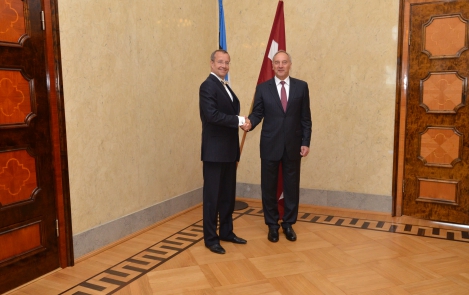-
Reset
+


President Ilves to President Bērziņš: Estonia and Latvia of the 21st century are two good friends
12.07.2011
“Estonia and Latvia of the 21st century are two good friends, who have never let each other down and have shared support and encouragement to each other,” said the President, Toomas Hendrik Ilves, to the new Latvian Head of State, Andris Bērziņš, who arrived on a working visit to Estonia. “The special nature of our relations is demonstrated by the fact that your first foreign visit as Latvian Head of State brought you to Tallinn and that Estonia is Latvia’s largest foreign investor.”
President Ilves acknowledged the leaders of Latvia who took responsible decisions during the recent credit crunch, thereby helping the country to remain strong despite the crisis.
“Both of us – Estonia and Latvia – have learnt the inevitability of responsible financial and economic policies and seen, based on the living example of some European Union Member States, what happens if the rules are broken,” said the Estonian Head of State. “A crisis highlights, with singular clarity, how important it is for the people to believe in their country. This is what helps people to understand and allows governments to organise the required changes. In general, we also need as much faith in Europe and European values.”
According to President Ilves, faith in Europe needs to be enhanced and developed in the countries that are the neighbours of the European Union, especially in those that attach high relevance to European reforms: “They need the support and encouragement of the European Union and their success is a part of the success of Europe.”
President Ilves, in speaking about regional projects, attached the highest priority to the Tallinn-Warsaw railway connection, Rail Baltic, which requires high-level political agreements between Estonia, Latvia, Lithuania, Poland and the European Commission to be realised, as well as energy-related co-operation for both the establishment of a regional natural liquid gas storage terminal and for the construction of a nuclear power station in Visaginas.
“If these joint ventures are successful, if we invest our money here, we are real agents and providers of solutions, not just people waiting for support,” told the Estonian Head of State. “All this forms a part of our security, the interests of our countries and the welfare of countries in general.”
President Ilves encouraged the border areas of Estonia and Latvia to engage in closer mutual relations.
“The enlargement of the Schengen area to the Baltic states opened small cross-border paths between Estonia and Latvia, which were once covered in grass. Now is the time for the local governments, businessmen and representatives of the third sector of the border areas to open up,” encouraged the Estonian Head of State. “Such co-operation is not only important in Valga-Valka, but this should be as close and regular in all the border regions as the political communication between Tallinn and Riga.”
In speaking about the Baltic Sea Strategy of the European Union, the Estonian Head of State described this as a method for bringing the Baltic and Nordic countries closer to forming a uniform region within the European Union.
“Transport must work, energy security must be ensured, the domestic market must be operable without obstacles and the region must become a real hub – a nursery of research and innovation,” President Ilves emphasised.
Office of the President
Public Relations Department
Phone 631 6229




